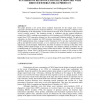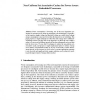199 search results - page 6 / 40 » Compiler Support for Reducing Leakage Energy Consumption |
DAC
2005
ACM
15 years 12 months ago
2005
ACM
Leakage energy consumption is an increasing concern in current and future CMOS technologygenerations. Procrastination scheduling, where task execution can be delayed to maximize t...
IJCSS
2007
14 years 11 months ago
2007
This paper presents a low power driven synthesis framework for the unique class of nonregenerative Boolean Read-Once Functions (BROF). A two-pronged approach is adopted, where the...
MJ
2008
14 years 11 months ago
2008
Circuits optimized for minimum energy consumption operate typically in the subthreshold regime with ultra-low power-supply voltages. Speed of a subthreshold logic circuit is enhan...
EUC
2004
Springer
15 years 4 months ago
2004
Springer
Abstract. Power consumption is becoming one of the most important constraints for microprocessor design in nanometer-scale technologies. Especially, as the transistor supply voltag...
125
click to vote
ICCD
2008
IEEE
15 years 8 months ago
2008
IEEE
— Run-time Active Leakage Reduction (RALR) is a recent technique and aims at aggressively reducing leakage power consumption. This paper studies the feasibility of RALR from the ...


